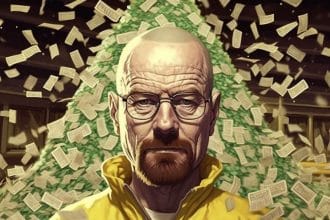The enigmatic world of F. Scott Fitzgerald's The Great Gatsby has captivated and intrigued readers for generations. A central focus of this classic novel is the seemingly impossible wealth amassed by the mysterious protagonist, Jay Gatsby. How did Gatsby get so incredibly rich in the fast-paced whirlwind of the roaring twenties? Was Gatsby's fortune inherited, or was it the result of moral business dealings? New revelations may indeed prove that the tremendous affluence of Gatsby wasn’t far wrong.
Intrigue thickens when we uncover the twisted tale of Cody’s mistress, who allegedly cheated Gatsby out of a fortune. In the aftermath, Gatsby’s insatiable desire for wealth leads him to the “old money” realm and the conflict between Tom and Gatsby’s conflicting social circles. As we delve deeper into the secrets behind Gatsby's fortune, the story starts to resemble an opulent yacht sailing across tumultuous seas, revealing compelling facts and figures of the money people of the time.
Let's explore the basic methods behind the wealth of one among the new literary symbols of wealth in the United States. We'll touch upon topics such as the sale of grain alcohol over the counter, exposing another side to this enigmatic character. Join us as we unravel the secrets that shook the foundations of high society and fueled the legendary opulence of Gatsby's extravagant world. Get ready because things are about to get interesting!
Key Takeaways
- Gatsby made his wealth through illegal means such as smuggling liquor and counterfeit stocks.
- Gatsby never explicitly says how he got rich and says that it’s his business.
- Gatsby did not come from a wealthy family and had to work hard to amass his fortune.
- Speculations suggest that Gatsby was a bootlegger and involved in illegal activities.
Gatsby’s Background
Gatsby didn't come from a wealthy family and instead dropped out of college. Still, his chance encounter with D. Cody, who taught him the ways of the rich, set him on the path to amassing wealth through prohibited methods like trafficking in booze during Prohibition or trading in fake stocks.
Gatsby’s pursuit of wealth was driven by his desire to win back his former love, Daisy, who had recently tied the knot with wealthy Tom Buchanan. Gatsby’s wealth represented his pursuit of the American Dream, and he compares and contrasts the new currency with the old.
He wanted to impress Daisy with his wealth and lavish parties, and his involvement in criminal activities reflected the excess and danger of the Roaring 20s. James Gatz was born to a poor family background, he served in World War 1 in the Sixteenth Infantry Regiment.
Gatsby’s story is a cautionary tale about the dangers of excess and the pursuit of wealth at any cost.

Meeting Dan Cody
You happen to meet a wealthy man named Dan, who takes you under his wing and teaches you the ways of the rich. You learn the art of yachting, fashion's importance, and money's power. Cody becomes your mentor, and you follow him on his many travels.
It is during this time that you acquire the skills and knowledge that eventually help you get wealthy. During this time, you meet Daisy F, the love of your life. However, Cody passes away and leaves you $25,000 in his will.
This inheritance is the start of your wealth, but it is your involvement in Prohibition-era legitimately lucrative bootlegging. You buy a mansion in West Egg and host extravagant parties to impress Daisy. You meet Nick Carraway through these parties, who becomes a confidant and friend.
A bootlegger's success is the result of their own initiative and hard work rather than any inheritance.
The Great Gatsby Inherit: D. Cody
Imagine receiving an unexpected inheritance from a mentor who taught you everything about the wealthy lifestyle, leaving you with newfound wealth and the opportunity to chase your dreams.
This was the reality for Jay Gatsby when he inherited $25,000 from Dan C., his mentor, and former yachtsman. Gatsby used this money to start his journey toward the American Dream, ultimately becoming wealthy through illegal means such as bootlegging during Prohibition. Prohibition sets the period well for the story him known to smuggle to make money.
Despite his wealth, Gatsby’s true desire was to win back his former love, Daisy Fay, who was married to Tom Buchanan. Gatsby’s involvement in criminal activities and his relationship with his mistress, Myrtle Wilson, ultimately led to his tragic demise at the hands of George Wilson.
While the source of Gatsby’s wealth may have been questionable, his ambition and determination to win back Daisy symbolize the era’s pursuit of the American Dream.

Falling in Love with Daisy
As one falls deeper in love with Daisy Fay, the desire to win her over and make her happy becomes all-consuming. For Gatsby, this meant making a name for himself and becoming wealthy.
He knew that Daisy was from a wealthy family and that in order to win her back, he needed to be on her level. Gatsby made his wealth by selling alcohol during Prohibition, specifically grain alcohol, and selling fake inventory.
He had grandiose celebrations at his chateau, which he funded by selling illegal booze. All of this was done to impress Daisy and prove to her that he was worthy of her love.
Even though Gatsby’s pursuit of wealth is fueled by his love for Daisy, she ultimately chooses to stay with her husband, Tom. This left Gatsby heartbroken and alone, his wealth and parties no longer able to bring him the happiness and companionship he desired.
It was all for naught, as his wealth did not bring him the love and acceptance he sought, and his past caught up with him in the end, resulting in his tragic death.
Becoming Wealthy: Gatsby Get Rich Now
Becoming wealthy was the only thing Gatsby wanted, his burning desire that fueled his every action and decision, driving him to risk everything to attain it. As we know, Gatsby became very wealthy.
Gatsby didn’t inherit any money and had to earn his wealth from scratch. He was a new type of wealthy guy who had amassed his wealth in questionably legal ways. include activities like trading in fake stocks and selling booze during Prohibition.
Gatsby met Dan, who taught him the ways of the rich, and James decided that he wanted to leave him $25,000 in his will. Gatsby’s wealth symbolizes his entrepreneurial spirit and ambition, reflecting the period’s search for the American Dream.
Gatsby’s lavish parties, held in his chateau, showed his desire to impress Daisy Fay. Gatsby’s story is a cautionary tale about the dangers of excess and the pursuit of wealth at any cost.
Organizing Extravagant Parties
Now that you know how Gatsby became wealthy, let’s discuss how he flaunted his newfound riches.
Everyone on Long Island was talking about Jay Gatsby and his lavish parties, with people flocking to his mansion just to glimpse the glitz and glamour.
But throwing such lavish affairs didn’t come cheap, and Gatsby had to rely on his illegal activities to fund them.
The parties were another way for him to impress Daisy, who he hoped would attend one day.
But even if she didn’t show up, Gatsby’s parties were legendary, cementing his name as the king of the social scene in West Egg.
It was just one more way that Jay Gatsby made a name for himself, proving that even someone from humble beginnings could make a splash in the world of the wealthy and become a symbol of the Roaring Twenties.

Speculations of Illegal Activities
You may have heard rumors about Gatsby’s involvement in illegal activities, which only added to his mysterious persona and made his wealth all the more impressive.
It’s no secret that Gatsby bought and sold alcohol during Prohibition, but there are also speculations about his involvement in other illegal activities.
Meyer Wolfsheim, a character in the novel, is heavily implied to be connected to organized crime, suggesting that Gatsby may have been involved with him.
There are hints of Gatsby’s involvement in smuggling and dealing in counterfeit stocks.
Regardless of how he made his money, Gatsby’s wealth and extravagant lifestyle reflected the excess of the Roaring 20s, and his mysterious past only added to his allure for those seeking a sense of belonging in the glamorous world of the rich.
Gatsby’s DropOut: Faster not Harder
Have you ever thought about what could’ve happened if Gatsby hadn’t dropped out of college?
Maybe he would’ve inherited a fortune, or perhaps he would’ve pursued a different career path altogether.
But instead, he meets Cody, who taught him about the ways of the rich and leaves him a sizable sum for Gatsby to inherit.
Gatsby changed his name and started his own business, which included selling alcohol during Prohibition.
His success made him wealthy, but it also brought speculation about his involvement in illegal activities.
Despite this, Gatsby remained focused on winning back Daisy F and acquiring a life of luxury.
His dropout may have led him down a different path, but in the end, his ambition and determination made him one of the richest and most mysterious figures in the Roaring 20s.
Bootlegging and Prohibition
During Prohibition, selling alcohol was illegal and risky, but Gatsby had a hand in the illegal spirits trade, which allowed him to amass great wealth.
Despite being born into a poor family, Gatsby was determined to become rich and gain the glitz and glamour of the wealthy. He turned to illegal means to achieve his goal and partnered with notorious figures such as Meyer Wolfsheim to sell illegal alcohol.
As a result of his involvement in selling illegal alcohol, Gatsby acquired vast amounts of money and climbed the social ladder, ultimately becoming one of the wealthiest men in America. This allowed him to buy a mansion in West Egg and throw extravagant parties, hoping to impress Daisy.

Although his wealth was built on illegal activities, it symbolized his ambition and drive to succeed despite his humble beginnings.
Gatsby’s Goal
Gatsby's involvement in illegal business during Prohibition is finally explained, let’s take a closer look at his ultimate goal.
Gatsby’s pursuit of wealth was not just for having money but rather to win back his former love, Daisy. Despite her marriage to Tom Buchanan, Gatsby’s obsession with Daisy drove him to amass a fortune and throw lavish parties to impress her.
Gatsby’s determination to win Daisy’s heart was evident in every aspect of his life, from his business dealings with Meyer Wolfsheim to his name change from James Gatz to Jay Gatsby. His wealth was merely a means to an end, and his ultimate goal was to be reunited with the love of his life.
Old Money vs. New Money
One of the major themes in The Great Gatsby is how the novel's characters and adversaries are affected by the shift from old to new currency.
Born into a poor family, Gatsby changed his name and made his fortune through illegal means, such as smuggling alcohol during Prohibition and dealing in counterfeit stocks. He was not endowed with any money and earned it alone, making him of the new money people.
While Tom Buchanan is considered “new money,” his fortune was passed down via his family. This distinction between old and new money is essential as it affects how the characters are perceived in society and their relationships.
Gatsby’s pursuit of Daisy, the love of his life, struggles since he doesn't come from a wealthy family, making him inferior in Tom Buchanan's eyes.
In the end, the Gatsby get rich lifestyle and pursuit of Daisy lead to his tragic downfall and suicide.

Inheriting Gatsby’s Wealth
Have you ever wondered who could’ve possibly inherited Gatsby’s unbelievable wealth?
Let me tell you, and it’s really one of the biggest mysteries left unanswered in the novel.
Despite Gatsby’s incredible wealth, he didn’t have any children or immediate family, and his illegal business dealings may have made it difficult for him to leave his fortune to anyone without drawing attention to himself.
Some speculate that Gatsby’s mentor, Cody, may have been there, but there is no evidence to support this theory.
Others believe that Gatsby’s parents, who have a brief appearance in the novel, may have inherited his wealth, but this is left unresolved.
One thing’s for sure, Gatsby’s business dealings with alcohol during Prohibition made him incredibly wealthy, and his name in the 1920s became shorthand for affluence and extravagance.
Conclusion
Congratulations, dear reader! You’ve now uncovered the mystery behind the source that made Jay Gatsby’s a rich man. Through exploring Gatsby’s background, his relationship with Cody, his love for Daisy, and his involvement in bootlegging, we have pieced together the puzzle of how he made his fortune.
But what can we learn from Gatsby’s story? One example could be the danger of pursuing wealth at all costs. Gatsby’s singular focus on achieving his goal of winning Daisy’s love led him to illegal activities and, ultimately, tragedy.
His downfall is a cautionary tale about the dangers of putting material possessions above all else. In conclusion, The Great Gatsby remains a timeless masterpiece, not only for its beautiful prose and compelling characters but also for its lessons about the pursuit of wealth and the corrupting influence of power.
As we continue to grapple with these themes in our lives, we can look to Gatsby’s story as a reminder of the importance of staying true to our values and avoiding the pitfalls of greed.
FAQ
How did Gatsby make his money and change his life?
Changed his name to Jay Gatsby from James Gatz, our protagonist earned his money from scratch after meeting a millionaire named Dan Cody. Cody coached the young Gatsby and took James Gatz under his wing, providing him with the opportunities and mentorship necessary for Gatsby to build his fortune. This transformation was a crucial step in Gatsby's journey to discover the glitz and style of the rich.
Did Gatsby make his fortune legitimately?
There are some shady aspects to Gatsby's wealth. It is suggested that Gatsby's business with Wolfsheim involved organized crime and illegal activities. Given this shadowy aspect of Gatsby's success, it's hard to determine whether he earned his riches honestly.
What happened between Gatsby and Cody's mistress?
Cody's mistress cheated Gatsby when she told Cody that his name was James Gatz, thus revealing Gatsby's true identity. This betrayal prevented Gatsby from receiving any of the inheritance that Cody left to him, which may explain why Gatsby resorted to illegal activities to make his fortune.
Was Gatsby part of the “old money” crowd?
Despite his immense wealth, Gatsby did not belong to the “old money” class. Rather, Gatsby was considered “new money,” having earned his money from scratch and without the privileges or family connections typically associated with people like Tom Buchanan.
What makes people want to see Jay Gatsby?
Want to see Jay Gatsby revolves around his elusive persona and his lavish celebrations. The mystery surrounding his wealth, combined with the rumors of his past, draws people to him as they try to get to learn more about this enigmatic figure.
How did Gatsby's life change when he met Dan Cody?
Before meeting Cody, Gatsby's life was unremarkable and impoverished. However, when Cody took James Gatz under his wing, Gatsby's life took a dramatic turn. Dan Cody coached Gatsby in the ways of the wealthy, leading to him eventually changing his name to Jay Gatsby and embarking on his quest for wealth and success.












